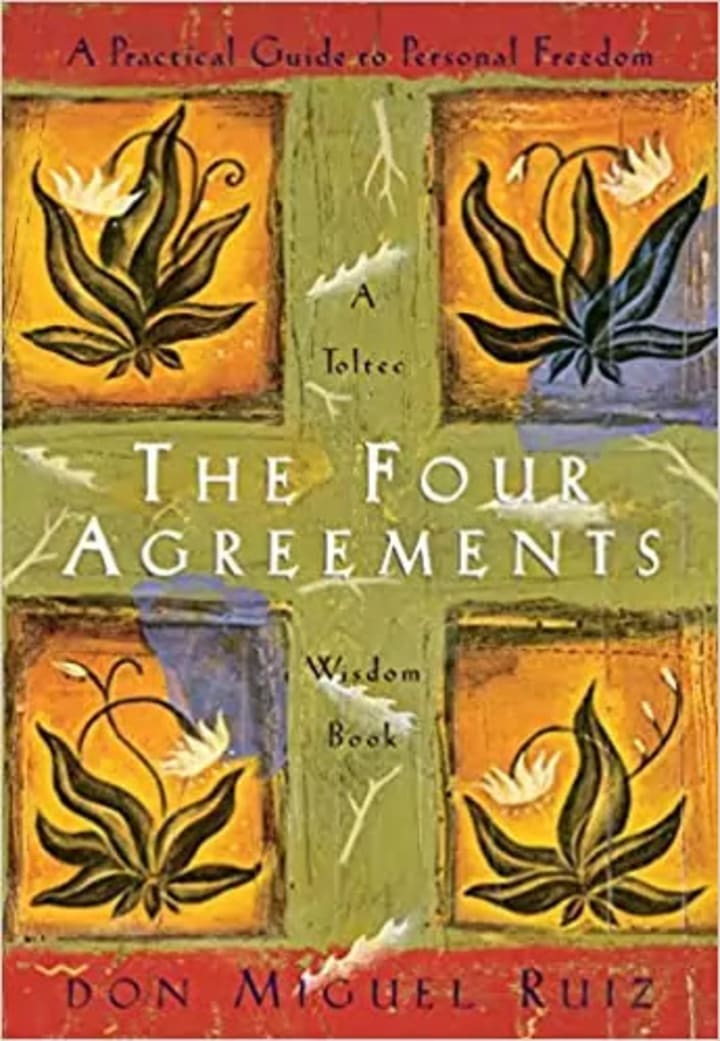Book Reviews by The Four Agreements: Don Miguel Ruiz
What are the four agreements of life by Don Miguel Ruiz?

The Four Agreements: A Practical Guide to Personal Freedom (A Toltec Wisdom Book) by Don Miguel Ruiz Book Reviews
What are the four agreements of life by Don Miguel Ruiz?
Introduction of The Four Agreements by Don Miguel Ruiz
The book “Four Agreements-The Practical Guide to Personal Freedom” has been very popular since its publication in 1997. After several reprints, it is still on the bestseller list.
Don Miguel Ruiz reveals the source of self-limiting beliefs that rob us of joy and create needless suffering. Based on ancient Toltec wisdom, the Four Agreements offer a powerful code of conduct that can rapidly transform our lives into a new experience of freedom, true happiness, and love.
This 4-color illustrated edition of “The Four Agreements” commemorates its 10-year anniversary. With 7 years on “The New York Times “bestseller list and nearly 4 million copies in print, “The Four Agreements” continues to top numerous bestseller lists.

The Four Agreements: Don Miguel Ruiz
Author: The Four Agreements: Don Miguel Ruiz
Author Don Miguel Ruiz grew up in a family of therapists in rural Mexico. He was the youngest of 13 siblings. The family expected him to inherit the mantle, but he chose to enter the modern medical system with his brother. Studying medicine in Tijuana, preparing to become a neurosurgeon.
A near-death car accident experience made a huge change in his life. He rethought the meaning of life, decided to return to tradition, learned the way of healing from his mother, and became a shaman.
Because of this special background, he was able to perfectly combine ancient wisdom with modern science, and explore the wisdom of ancestors from the perspective of modern science.
Ruiz is a prolific author who, in addition to The Four Agreements, has published The Mastery of Love, The Voice of Knowledge, The Fifth Agreement, and The Toltec Art of Life and Death published in 2015.
The Four Agreements by Don Miguel Ruiz Quotes
When you fall in love with someone and have a relationship with that person, you find reasons for your love. You only want to see what you want to see. Refuse to admit that there is something in him that you don’t like. You lie to yourself in order to prove that you are not wrong. When you really can’t fool yourself, you’ll make assumptions, and you’ll say, “My love can change him.” But that’s not the case. Your love can’t change anyone. If others change, it’s because they want to change, not because you have the ability to change them.
And then, one day, he hurt you. Suddenly, you see his flaws — things you didn’t see before; now, magnified by your emotional poison, they appear so dazzling. You need to find some reason for your misery, and you start to blame him for all kinds of wrongs; you hate yourself for seeing the wrong person.
In fact, love needs no reason. To love is to love, not to love is not to love. True love is accepting others as they are, not trying to change them. If we want to change them, we don’t really love them. When you decide you want to live with someone, it’s best that person is who you want to be, and that preferably doesn’t require any remodeling. It’s easier to find someone who looks the way you want than to try and change someone. That person should love you the way you are now, so there is no need for him to change you. If the other person keeps trying to change you, it means that he doesn’t really like you the way you are. Since you don’t meet his expectations now, why should you be with him?
……
One day you will stop making assumptions about your lover. One day you will stop making assumptions about anyone. There will be a qualitative change in the way you communicate; there will be no more conflicts between you and others caused by false assumptions; your relationships with others will no longer be damaged.
Asking more questions can prevent you from making assumptions. When communicating with others, make sure you hear what the other person is saying. If you don’t understand, ask. Take the courage to keep asking questions until you no longer have any doubts. When you no longer have doubts, you no longer need to make assumptions. Since all the questions have been answered, why make assumptions?.
Of course, just because you don’t have a question doesn’t mean you know everything; there may be some issues you haven’t noticed. Don’t assume you know everything. — -Quoted from Chapter 4, The Third Covenant — No Assumptions
The Four Agreements by Don Miguel Ruiz Summary
In the early 1970s, in his final year of medical school, Miguel Ruiz had a bad car accident that changed the course of his life. He had been raised in rural Mexico by a mother who was a curandera (healer), and by a grandfather who was a nagual (shaman) but had left behind their traditional ways. Despite the severity of the accident Ruiz was miraculously unhurt and had a spiritual experience he could not explain. In the aftermath, he turned to his family’s ancient Toltec wisdom and set about becoming a nagual himself, committed to guiding people to greater mental freedom.
Awaking from the dream
In Toltec wisdom, the world or ‘reality’ is seen as a collective dream. The word used for this fog of perception is Mitote, which is similar to the Hindu word for illusion, Maya. This dream is the same as normal dreams, except that its rules and customs of understanding and behaving enable it to seem more real. We are born into a ready-made phantasm that includes language, culture, religion, and family, and we agree to go along with it because it is too difficult to resist. Ruiz describes this process as ‘the domestication of humans’.
In order to get by, we make invisible agreements with others — spouse, children, society, God — but the most important agreements we make, Ruiz says, are with ourselves. Some of them benefit us, but many others make us suffer. We hang onto them because we believe we would be something less without them. According to Toltec wisdom, most people’s problems stem from not being able to forgive themselves that they are not perfect, yet it is other people’s rules that they are trying to measure up to — not their own.
The good news is that by becoming conscious of our agreements we can begin to control our lives. We can declare a war of independence in which we decide how we will view the world. In shamanic traditions, Ruiz notes, individuals are called ‘warriors because they fight the parasite in their own minds.
The Four Agreements became a bestseller after actor Ellen Degeneres spoke of the book while on Oprah Winfrey’s television show. While the concepts within Toltec wisdom are far from simplistic, the agreements themselves are easy to remember.
1. Be Impeccable With Your Word
We need to speak with a pure attitude and express our true feelings. There is power in every word we say. Avoid using words to criticize yourself or others. Vicious language is like black magic that will sow bad seeds in people’s hearts. We should use the power of words to express innocence and love.
The author gave an example, a little girl happily sang and danced at home, her mother dragged her tired body home, her daughter’s singing gave her a splitting headache, so she yelled: “Stop singing, it’s ugly. !” Mom said this sentence actually only reflects her personal truth (the body is not feeling well and needs to be quiet), and it has nothing to do with the girl’s voice. But suppose the little girl believed what her mother said and said to herself (promise) in her heart: “My voice is ugly, it will make others feel uncomfortable, I will stop singing.” The mother’s words become black magic, Casting a spell on the little girl’s life not only made her stop singing but also affected his interpersonal interactions.
Once we believe and accept other people’s comments, we make an agreement with ourselves, and this agreement will become part of our thought system and shape our values.
Also read: The Four Agreements by Don Miguel Ruiz
2. Don’t take anything personally
What others do is not directed at you, others’ words and deeds are just projections of their own reality and dreams. When you are influenced by the words, actions, and opinions of others, you are trapped in a victim situation.
Once you personalize things, you often feel violated and fight others in defense of your own ideology. Small things become big, and everything has to be won. In fact, what you do is just project your own dreams, reality, and your promise to yourself.
When the author is talking about things here, he means anything, both good and bad. Whatever someone says to you, “You suck!” or “You are awesome!” has nothing to do with you, but reflects the personal truth of the speaker. When we don’t personalize things, we don’t get hurt by what other people say or do.
When you have made an agreement with yourself “Don’t make things personal”, you can express your true emotions and thoughts freely, and you can say “I love you” to the person you like without the fear of rejection, again, you can say no to others without any guilt or self-judgment. Even in the toughest of times, you can keep your peace of mind.
3. Don’t Make Assumptions
Have the courage to ask questions and express what you really want. Communicate as clearly as possible with others to avoid misunderstandings, upsets, or hallucinations. This agreement alone can completely change your life.
All sadness and illusions come from assumptions and personalizing things that are deeply embedded in our thinking system. We make assumptions out of fear of understanding the truth, and we get bogged down by constantly trying to prove others wrong in order to keep our assumptions right. When encountering doubts, it is best to ask directly, rather than deduce in our hearts, which will make us emotionally uneasy.
In our intimate relationship, we often think that the other half knows me well, even if I don’t say it, he knows what I’m thinking. When the other person doesn’t do what you want and meet your needs, they feel hurt. In fact, all this suffering comes from our own creation of false assumptions.
The author gives an interesting example:
You walk into the mall one day and see your crush there, he turns around and smiles at you, and walks away. You may have assumed this experience because of this experience: “He must be smiling at me because he likes me.” You are so convinced of your thoughts that you start a series of scripts in your mind: He likes me, and soon after We’ll date, and he’ll propose to me…” All this fantasy comes from your false assumptions.
4. Always Do your Best
Your best state can change from moment to moment, depending on your state of health at the time. No matter what the situation, as long as you do your best, you will not self-judgment, self-abuse, or regret.
This concept is actually commonplace, but the author’s emphasis on ‘’JUST DO YOUR BEST’’ is refreshing. Different from the previous concept of teaching people to sprint and work hard, the author emphasizes balance. No more, no less, if you don’t try your best, you’ll regret it, but if you push too hard, it can also damage your body and mind.
For example, many people go to work every day thinking only about payday, every day looking forward to the weekend, they work for pay, they don’t like their job and they don’t give their best. They don’t do it voluntarily, they have to, they have to pay the rent, they have to support their families, they are not happy at work, so they indulge on weekends and do whatever they want. They don’t like themselves, they don’t like their whole life, so they do a lot of things that hurt themselves like drinking.
The author believes that if you do things without expecting pay, you will enjoy the whole process, do your best, and when you try to do your best, you will be paid more. And you do it all the time, over and over, and you become an expert in a field.
However, here he did not specifically point out how to change his mind, from necessary to voluntary? This should be the most important step. Also, working without expecting pay feels a little unrealistic, and life is a real problem. Moreover, the way of doing things is also very important. It does not mean that you will get huge rewards if you work hard and enjoy the process. The weather, location and people are also influencing factors.
Book Reviews by The Four Agreements: Don Miguel Ruiz
This book makes a point that all of us have prejudices against other people, our fears about the future and our annoyance about the past are all our own dreams. Everyone has their own dreams, and the whole society is a huge dream. intertwined and influenced each other. And the effects of these dreams are the things we take for granted: gossip, lies, abuse, aggression, suspicion, emotional outbursts, control, low self-esteem, self-doubt, and suspicion of others.
The second part is the main part. The author talks about 4 main ideas to overcome these influences. First of all, we must realize the existence of this fantasy, that is, realize that many of the judgment standards we have adhered to since childhood are wrong, and many are harsh on ourselves. Requirements do not have to exist, you must be conscious before you can change.
First, use words carefully and speak well
This principle sounds very simple. Everyone knows the benefits of paying attention to words and deeds. But the other side of the book that mentions the careful use of words touched me very much. He said, pay attention to your words not only for others but also for yourself. Have we ever had this situation?
When doing a challenging thing, get used to belittling yourself:
I can not,
I’m just not as good as anyone else,
Also read:12 Rules for Life by Jordan Peterson
I don’t have the talent to do this,
I am stupid
When accused by others, doubt yourself:
Did I do something wrong just now?
I’m talking like that, right?
Am I not good enough?
Slowly become inferior, cautious, afraid to try new things, dare not be yourself, lose creativity.
This is because we have always grown up in an environment of public rules, and there are many false rules that restrict us. From childhood to adulthood, we grew up under various rules, restricted by parents and teachers, and through rewards or punishments, What they said must be right. If you don’t reach it, you will be punished. If you reach it, you can be rewarded. When we grow up, we can finally be independent and make money by ourselves, but are you really independent? Maybe in a certain In ways, but in psychological terms, some people are just children forever, their rulers become superiors, bosses… Because we were raised in captivity from childhood to adulthood.
Over time, we get used to being condemned, and we learn to condemn others and learn to condemn ourselves.
Pay attention to the words you use and speak well, it is to let you climb out of this trap. Language is a hint weapon. It will give psychological hints to the listener. After listening to some words for a long time, you will really develop in this direction, so don’t be casual. Despise yourself and don’t judge others.
About the Creator
Muhiuddin Alam
I'm Muhiuddin Alam, a blogger and content writer. Explore book recommendations and reviews of fiction, novels, and nonfiction on your trusted site ReadingAndThinking.com. & Geek Book Reviews.com
Enjoyed the story? Support the Creator.
Subscribe for free to receive all their stories in your feed. You could also pledge your support or give them a one-off tip, letting them know you appreciate their work.






Comments
There are no comments for this story
Be the first to respond and start the conversation.